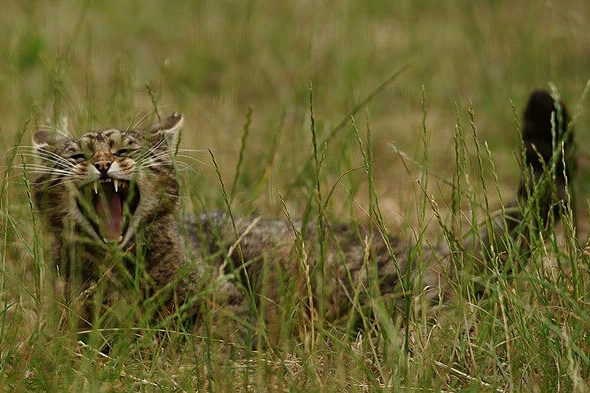
Conservationists report the success of the UK’s first-ever wildcat release, with 19 cats thriving in Cairngorms National Park in the Scottish Highlands and only one recorded death.
Monitored by GPS-radio collars as part of the Saving Wildcats project, a collaboration involving the Royal Zoological Society of Scotland (RZSS), NatureScot, Forestry and Land Scotland, and the Cairngorms National Park Authority, the initiative aims to bolster the endangered wildcat population.
Thirteen kittens bred at RZSS’s Highland Wildlife Park are slated for release next summer.
Wildcats, known for hunting mice and voles in grassland and woodland, face challenges during winter due to prey scarcity and harsh weather.
The project is deemed a success so far, and the team collaborates closely with landowners hosting wildcats, ensuring legal protection for the animals and their den sites.
Helen Senn, RZSS head of science and conservation programmes, said “Life in the wild is full of risks and while most of the wildcats are currently doing well, it would be highly unusual for all to survive the first year.
“The field team were alerted to a potential mortality through movement data recorded by GPS collars.
“A post-mortem examination carried out by our expert veterinary team revealed the cat sadly died of peritonitis, an infection.
“Further releases and many more years of conservation action will be required to increase the likelihood of saving this iconic species in Scotland.”
Visitors encountering wildcats are urged to keep locations confidential to prevent disturbance.
——————————————————————————
At Natural World Fund, we are passionate about stopping the decline in our wildlife.
The decline in our wildlife is shocking and frightening. Without much more support, many of the animals we know and love will continue in their decline towards extinction.
When you help to restore a patch of degraded land through rewilding to forests, meadows, or wetlands, you have a massive impact on the biodiversity at a local level. You give animals a home and food that they otherwise would not have had, and it has a positive snowball effect on the food chain.
We are convinced that this is much better for the UK than growing lots of fast-growing coniferous trees, solely to remove carbon, that don’t actually help our animals to thrive.
This is why we stand for restoring nature in the UK through responsible rewilding. For us, it is the right thing to do. Let’s do what’s right for nature!
Donate today at https://naturalworldfund.com/ and join in the solution!

